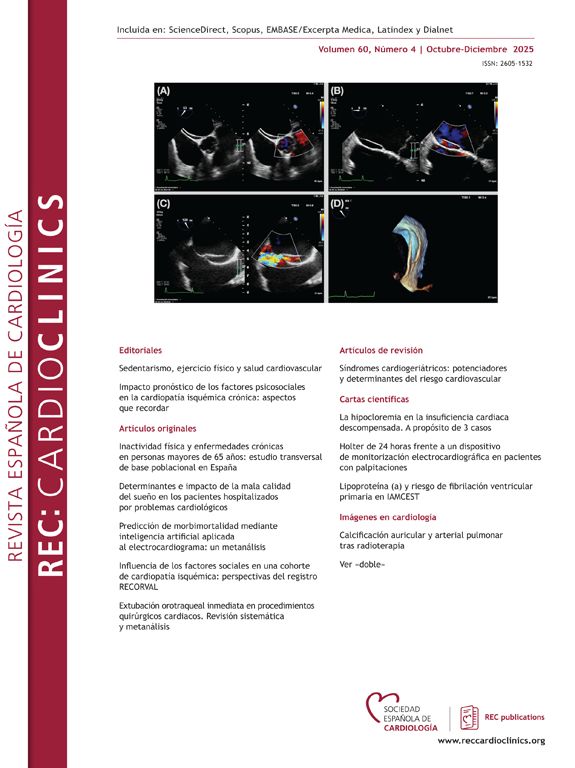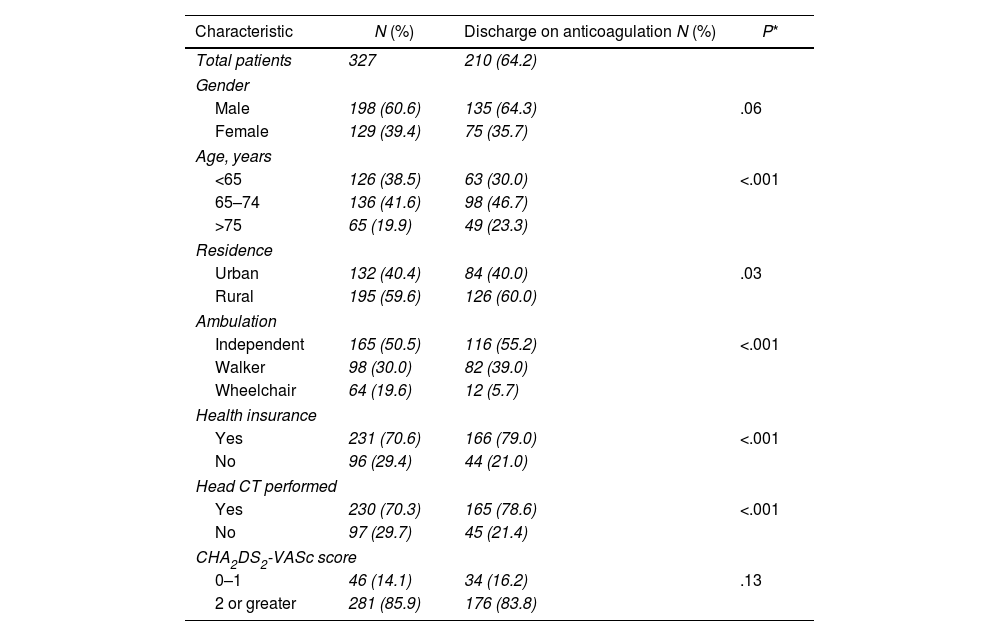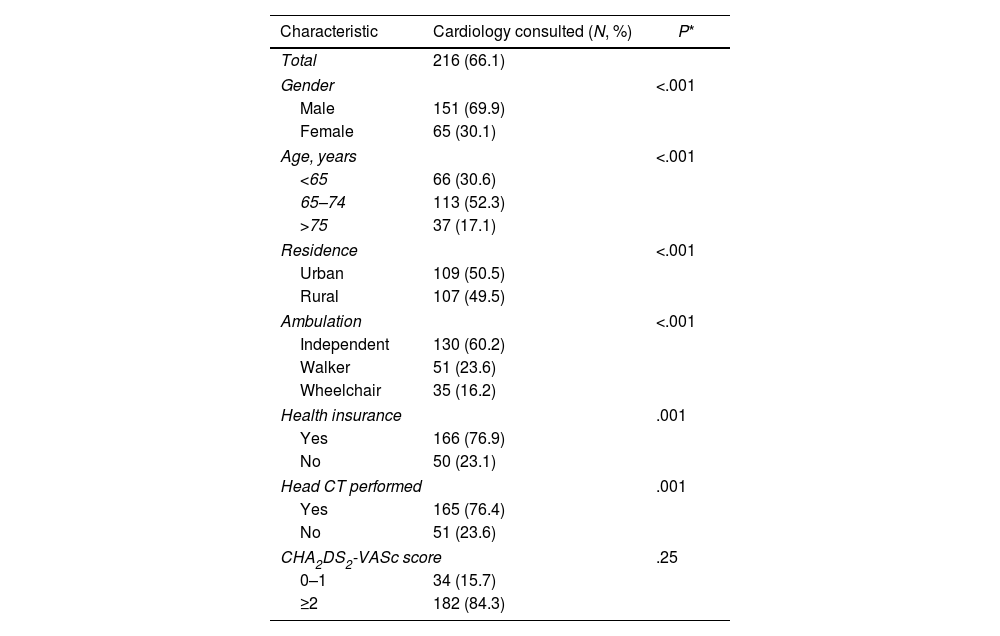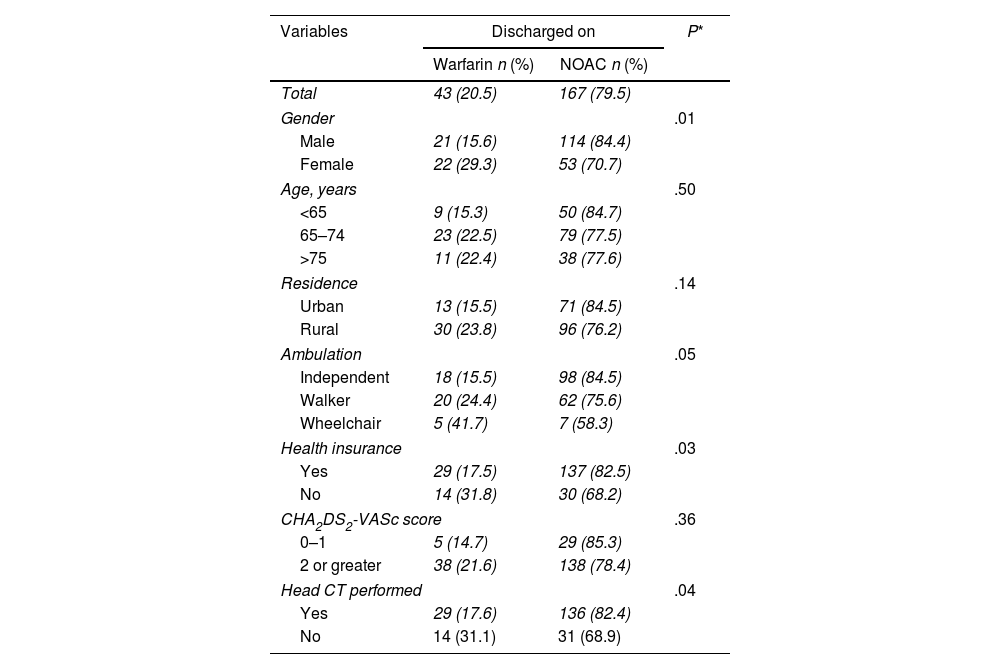The choice to start or stop anticoagulation therapy in elderly patients post-fall is a major clinical challenge because falls increase the risk of bleeding. However, anticoagulation is essential in patients with atrial fibrillation (AF) to prevent thromboembolic events, and concerns about bleeding and bias may result in the prescription of anticoagulants. This study, conducted from September 2019 to October 2023, examined patients aged>50 years with AF who fell in-hospital, with the aim of identifying influencing anticoagulant prescriptions.
MethodsAll the patients included in the study experienced falls during hospitalization. It is important to note that these falls were not a reason for admission.
ResultsOut of the 327 patients in the study, 210 (64.2%) were discharged on anticoagulation therapy, and 79.5% received non-vitamin K antagonist oral anticoagulants. Significant associations were found between cardiology consultations and male participants (P<.001), those aged 65–74 (P<.001), and those with health insurance (P=.001). Patients aged 65–74 years (P<.001), rural residence (P=.03), independent ambulation (P<.001), and health insurance (P<.001) were significantly associated with anticoagulation discharge.
ConclusionsContrary to expectations, the decision to initiate oral anticoagulation in hospitalized patients with AF and a history of accidental falls was not primarily based on risk scales such as CHA2DS2-VASc but rather on other clinical, social, and medical coverage conditions. This underscores the need for a more nuanced understanding of the factors influencing anticoagulation decisions in this vulnerable population.
La elección de iniciar o suspender el tratamiento anticoagulante en pacientes ancianos tras una caída es un reto clínico importante porque las caídas aumentan el riesgo de hemorragia. Sin embargo, la anticoagulación es esencial en pacientes con fibrilación auricular (FA) para prevenir eventos tromboembólicos, y las preocupaciones sobre el sangrado pueden afectar a la prescripción de anticoagulantes. Este estudio, realizado entre septiembre de 2019 y octubre de 2023, examinó a pacientes mayores de 50 años con FA que sufrieron caídas durante su estancia hospitalaria, con el objetivo de identificar los factores que influyen en la prescripción de anticoagulantes.
MétodosTodos los pacientes incluidos en el estudio sufrieron caídas durante la hospitalización. Es importante destacar que estas caídas no fueron motivo de ingreso.
ResultadosDe los 327 pacientes del estudio, 210 (64,2%) fueron dados de alta con tratamiento anticoagulante, y el 79,5% recibieron anticoagulantes orales no antagonistas de la vitamina K. Se encontraron asociaciones significativas entre las consultas de cardiología y los participantes varones (p<0,001), de edad entre 65 y 74 años (p<0,001) y los que tenían seguro médico (p=0,001). Los pacientes de 65-74 años (p<0,001), residir en un área rural (p=0,03), la deambulación independiente (p<0,001) y tener seguro médico (p<0,001) se asociaron significativamente con anticoagulación al alta.
ConclusionesContrariamente a lo esperado, la decisión de iniciar la anticoagulación oral en pacientes hospitalizados con FA y antecedentes de caídas accidentales no se basó principalmente en escalas de riesgo como CHA2DS2-VASc, sino más bien en otras condiciones clínicas, sociales y de cobertura médica. Esto subraya la necesidad de comprender mejor los factores que influyen en las decisiones de anticoagulación en esta población vulnerable.
Article
Use datos de acceso a SEC en el menú Acceder.
Si es socio de la Sociedad Española de Cardiología y no puede acceder con sus claves, escriba a rec@cardioclinics.org.
Use the Society's website login and password here.
If you are member of SEC and you have some problems with your login data, please contact with rec@cardioclinics.org.












